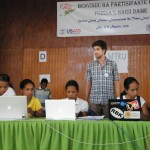A Kaleidoscope of Experiences
By: Nelson Sanz-Cadena
Access to information remains a major challenge faced by youth in Timor-Leste. This has been constantly expressed by participants attending forums organized by Search for Common Ground Timor-Leste (SFCG-TL). While access to radio, television and newspapers has increased in the country, more than 16% of the population have no access to any form of media (radio, television, newspapers, internet or mobile phones). This represents a challenge for SFCG-TL, which aims to reach the vast majority of young people in the country, but encounters great limitations in terms of infrastructure and human capital when attempting to disseminate its message.
In post-independence Timor-Leste, radio still has the highest reach of all media. Therefore, radio has become the cornerstone of a comprehensive two-year peacebuilding initiative conducted by SFCG-TL. Building upon the success of the radio magazine Babadok Rebenta! (“Drums of Peace”), SFCG-TL is about to launch its first radio drama Karau Dikur ba Dame (“Buffalo`s Horn for Peace”). The project aims to improve the development prospects of youth in Timor-Leste through skill building. The radio drama will provide youth with alternative methods to solve conflict situations through scenarios that correspond to their realities. In addition, outreach activities will accompany the radio drama and enhance mechanisms for collaboration among different youth groups.
I was fortunate enough to work with local staff on the production of this radio drama program during a three-month internship in the capital of Timor-Leste, Dili. I supported the local manager in the production of 25-episodes of the radio drama. I also designed and implemented an evaluation system to document and monitor the development of the recording process. This radio drama will be broadcast nationwide through a network of sixteen (16) local community radio stations. The main topics discussed in the drama series are: unemployment, martial arts, domestic violence, land disputes and elections. All episodes are in the Tetum language, the main language of communication amongst the Timorese.
The internship at SFCG gave me a better understanding of the major challenges faced by an international organization working in a post-conflict setting.
SFCG-TL is one of the few international non-government organizations completely run by Timorese nationals. This is a reflection of the organization`s approach towards capacity building and empowering locals by providing them opportunities to design and execute projects directed towards their local communities. Capacity building is still an on-going process due to the low level of education of the population, limited project management experience and organizational skills. Limited access to sources of information, poor internet connection and constant power cuts were among some of the issues that the office team had to deal with on a daily basis. Communication with staff was challenging because not everyone, including myself, was able to communicate in Tetum, Portuguese, Bahasa or English—the four most widely spoken languages. All of these issues were major challenges for the radio production, particularly in managing the team to organize and complete tasks effectively.
As an outcome-oriented person, I tried to facilitate the work of the team leaders by providing tools to enable more effective and efficient work. For example, I set up a (physical) calendar in the office as a task-track mechanism to allow staff to plan around the radio drama production. By doing so, I was able to convince the team leaders and volunteers to dedicate two days a week to the production of the radio program, which resulted into its successful completion two weeks ahead of schedule.
Being involved in the production of Karau Dikur ba Dame gave me a new perspective and deepened my knowledge on the issue of youth in post-conflict settings. This motivated me to explore this issue further and include youth and violence in Timor-Leste as a research topic for my master dissertation. The internship at SFCG-TL has been a challenging but rewarding experience throughout which I have been able to develop a better understanding on the multidimensional nature of the problems affecting post-conflict societies. Working closely with local colleagues, volunteers and stakeholders represented a unique opportunity to gain insights into the Timorese culture, its people and history.
###
Nelson is an International Analyst born in Caracas, Venezuela. He attended the Central University of Venezuela for his Bachelor’s degree in International Studies. He also earned a Master´s Degree in International Relations from Macquarie University, Australia.
As a 2010-2012 Rotary Peace Fellow in Tokyo, Japan, Nelson’s research has focused on youth non-participation on violence in post-conflict societies. The internship at Search for Common Ground in Timor-Leste has given him a unique opportunity to gain first-hand experience working with young people on the ground while enhancing his understanding about those protecting factors in the Timorese society that may contribute to the good behavioral development of this sector of the young population.
You can contact Nelson at [email protected], Twitter: @nelson_sanz











